
Resources for Living With ADHD
New content added regularly sporadically
How To ADHD
Jessica McCabe’s short videos about adult ADHD are perhaps the most relatable, down-to-earth explanations out there. While she does have a website, her YouTube videos are truly some of the best resources available.
ADDitude Magazine
All content is free—you don’t need to subscribe or pay in order to access the info on this site. An absolute treasure trove of info on all things ADHD.
ADHD & Marriage
Melissa Orlov is the author of several books written from the perspective of a non-ADHD wife (herself) living with an ADHD-husband. I highly recommend her book The ADHD Effect on Marriage, and her website also contains many other useful resources.
Taking Charge of Adult ADHD
Russell Barkley is one of the world’s leading experts on ADHD. This book is formatted to be ADHD-reader-friendly—short paragraphs, lots of bullet points/lists, and does not need to be read from front to back in order to benefit from it. Also available on Audible.

Tips, Tricks, Techniques

Myth-Information
If you’ve spent enough time down the rabbit hole of learning about ADHD online, you’ve probably started to see a fair amount of ads for ADHD products. Be very skeptical about these advertisements. In my experience, the vast majority of the products that show up in online ads about ADHD are either partially or completely inaccurate and misleading. Red flags to watch out for include:
Sounds too good to be true.
Because it probably isn’t true.
Claims to “cure” or “eliminate” ADHD.
This isn’t possible. There’s no “cure” for ADHD. You learn skills to handle symptoms more effectively over time.
Claims to be fast, easy, simple, etc.
We all want this to be true, but good treatment actually takes time and effort on your part.
Claims to quickly diagnose or test for ADHD, or that “only people with ADHD can complete this puzzle.”
Assessment for ADHD is unfortunately not so simple. It requires a thorough assessment by a licensed clinician, and usually takes a number of hours/sessions in order to be accurate.
Provides inaccurate information about ADHD. Connects ADHD to trauma, infidelity, hypersexuality, etc.
Don’t trust an advertisement to provide accurate information on anything, let alone a diagnosable condition.
Sample Ads
(with my added commentary in pink)

Memes
A collection of humorous memes, comics, pictures, etc., to help us all laugh at the unique and relatable aspects of our ADHD.
All content was found online from various sources. None of this can be credited to Dave Payne.
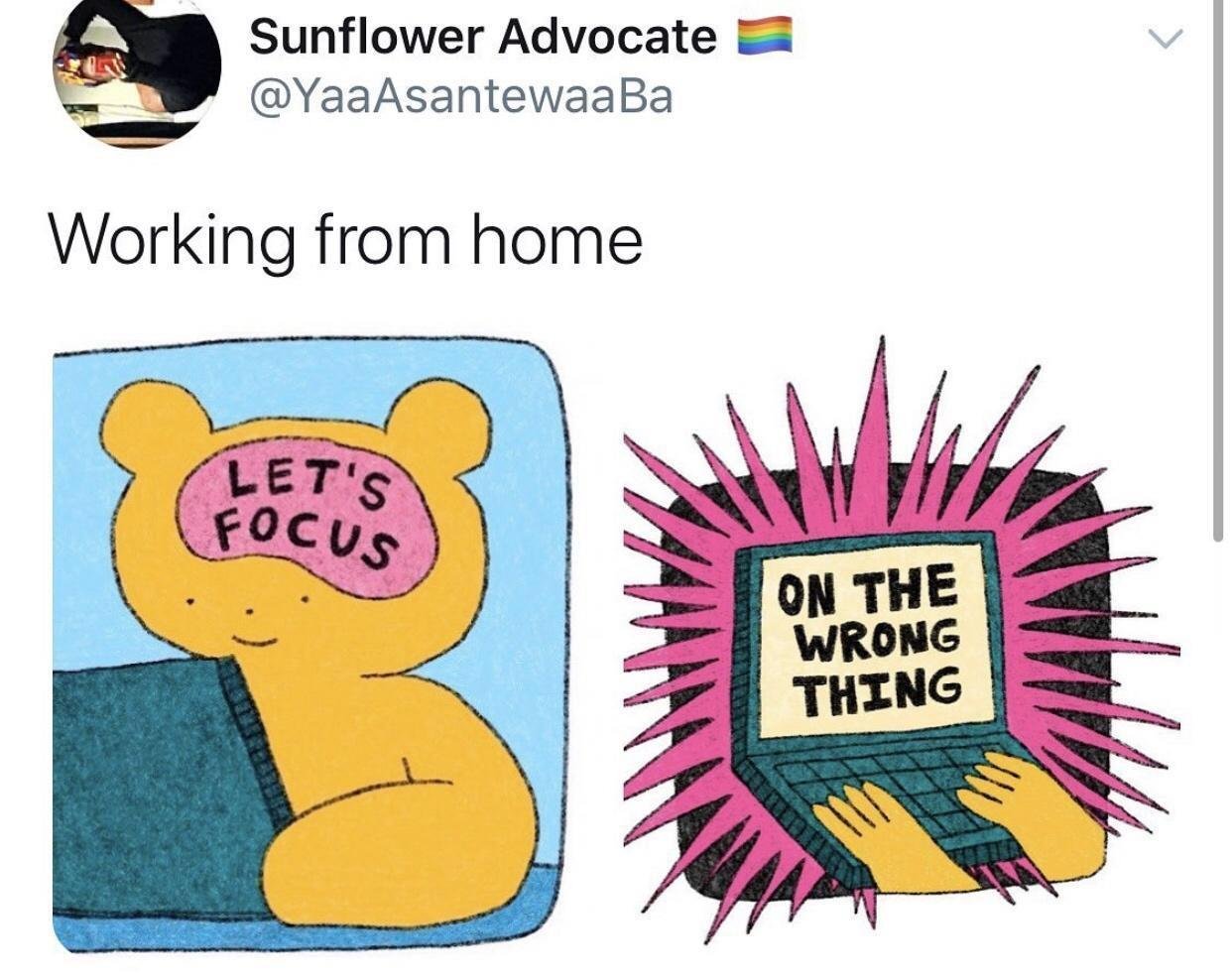
Cartoon bear with sleep mask labeled "Let's Focus" next to a laptop with "On the Wrong Thing" on the screen. Caption reads "Working from home."

Meme showing a person lying between two large wooden ear trumpet sculptures in a forest, with the caption "ADHD people picking up noises that no one else in their family could hear."

A meme depicting a somber man with text: "When the laundry is done drying but it has to be folded and put away:" and "I know what I have to do, but I don’t know if I have the strength to do it."

A man pointing to a whiteboard with text reading "ADHD is like having the best idea and then" on the top half of the image. The bottom half shows the whiteboard blank.

Meme with a glowing, transparent human figure leaving a person's body, with text that reads "The ADHD leaving my body when my mom tells me to 'Get a planner.'"
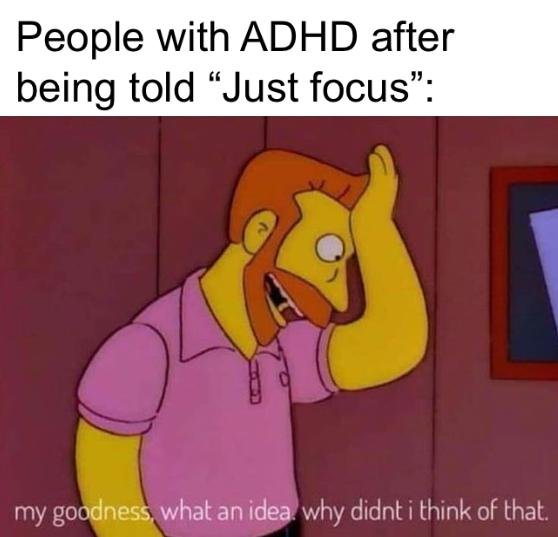
Cartoon character facepalming, captioned 'People with ADHD after being told "Just focus"' and 'my goodness, what an idea, why didn't I think of that.'

Meme with cartoon dog resembling "This is Fine" in front of rainbow, text about executive function task and low dopamine.

Meme of a smiling man in a suit with text, "ADHDers crossing off one item from their to-do list. Some days I am just on fire."
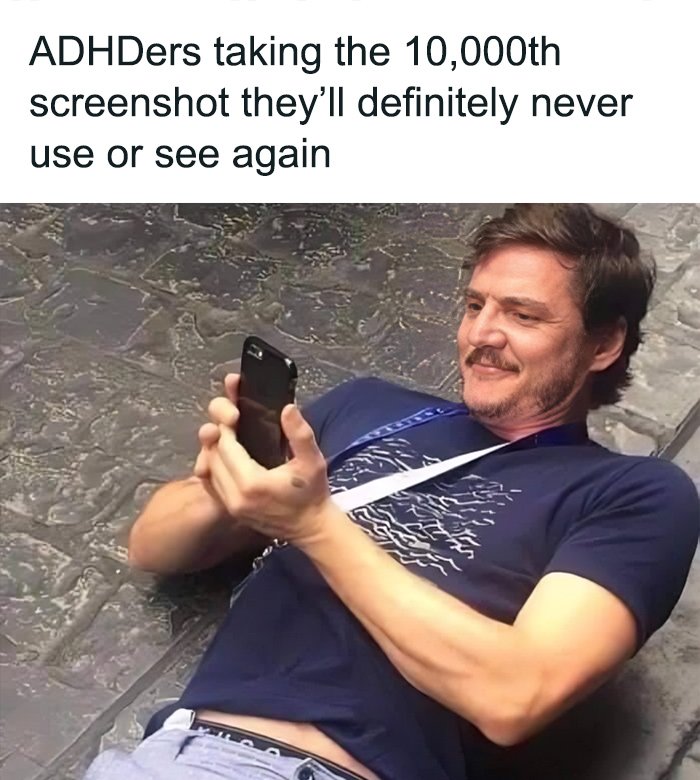
Meme of a man lying down, holding a smartphone, with text about ADHD and screenshots.

Meme about ADHD featuring a scene from a pawn shop reality show with two men in black shirts. Top text says "Completes task* Me: 'Where's my sense of accomplishment?' ADHD brain:" Bottom shows quote "Best I can do is a sense of relief."

Meme about ADHD prioritization with a character from a TV show saying "I will have seven first priorities."
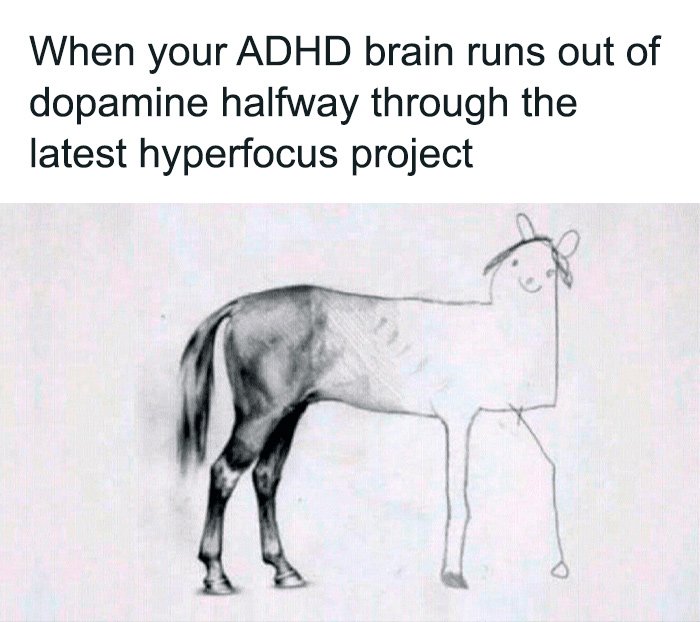
Illustration of an unevenly drawn horse, with detailed hindquarters and a simple front, accompanied by a caption about ADHD hyperfocus.
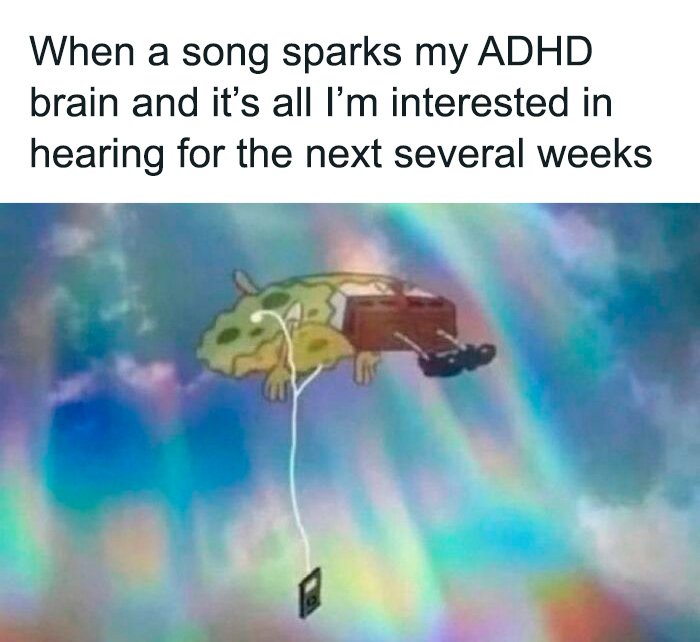
Surreal image of an animal with earphones connected to a music player, floating in colorful clouds, with text above about ADHD and songs.

Meme of a man with a beard holding a bottled drink, with text about forgetting ADHD medication.

Fidgets
Ah, fidgeting…a simple little thing that can help us pay attention (sometimes). I use fidgets during Zoom sessions, and I’ve acquired quite a few over the past 15+ years.
Here are some of the fidgets I’ve personally found to be particularly useful. I have no affiliation with any of these companies and get no commission, so I’m not trying to sell you anything. And don’t just take my word for it; decide for yourself whether you think you’d like a product before ordering it. One person’s paperweight is another person’s fidget….
Stimagz
These Stimagz are some of the more versatile fidgets I’ve found. Held together by strong magnets, it’s a simple enough concept that seems to have some staying power in my collection—I still pick them up regularly during sessions, even after having them for several months now.
The original Classic version is hard plastic and slightly noisier because the pieces click when they make contact with each other. I more recently got the Simagz Series II, which are made of a slightly softer plastic that makes them significantly quieter.
As far as I can tell, this company seems to make durable, quality-built products. They don’t feel cheap…and they’re not! They come in sets of 12 sticks: Classic $30, Series II $42.
Therapy Putty
I use this Therapy Putty on a daily basis. Perfect for fidgeting, the putty has no noticeable odor and doesn’t stick to skin (which is very important if you spend a lot of time typing notes).







